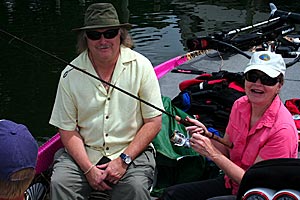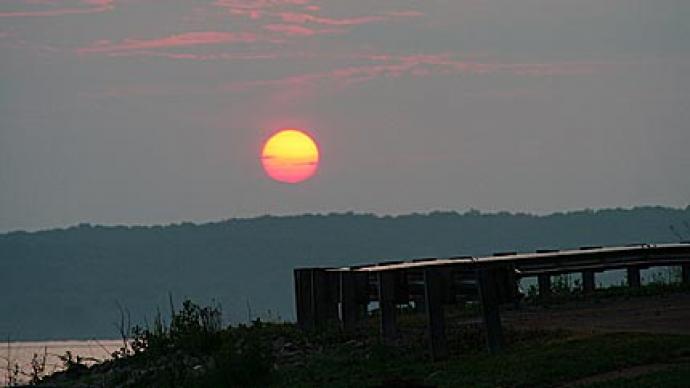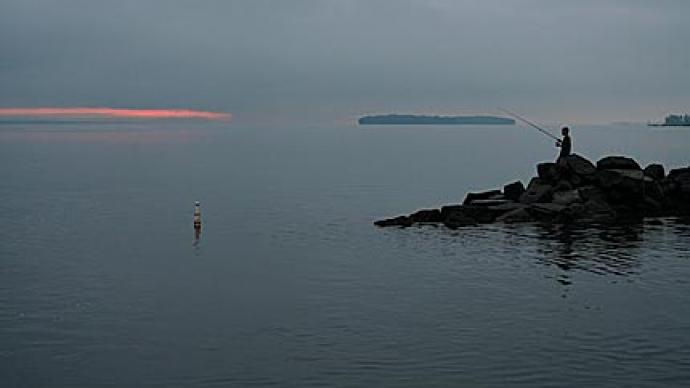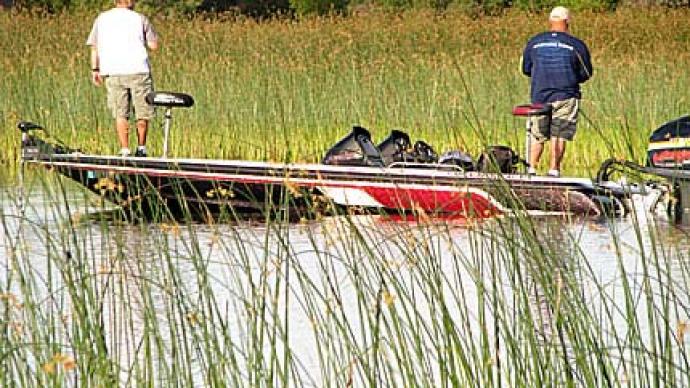"There's nothing you can do
that can't be done…"
Jake my friend…you're up.
Your Question: "What person, event, or factor in your life (fishing or non-fishing) made the biggest positive impact on you, and 'made' you the person you are today?'
I'm going to answer this in the same vein, style of "Came The Hawk…" so buckle up, put on the flame suit, check the rip-cord bud, you're going for a ride.
Dateline: Sum Of The Parts
I stood leaning on a mailbox.
Outside a pizza joint. Street corner. Summer night. I was in a tattered jacket.
My colors.
The logo of a gang, we called them a "Frat" back then, emblazoned on the back of the jacket, and stitched over my heart was the name "Bones."
My motorcycle was parked in a tow zone, as were several others. Strapped to the raked front end was a baseball bat.
On the handle was black electrical tape.
On the sweet spot was blood.
In my right pocket was a pair of steel knuckles bought at a local pawnshop.
In my left pocket was a switchblade with a dragon inlaid on the black handle.
Stuck in my belt, in the small of my back, was a stolen .38 pistol.
Loaded.
It was going to be a Friday night to remember. Thirty or so of us were going to show up at a high school dance. I had been off the streets for a couple of weeks, since the last dance we went to; the last dance where a rival "Frat" also showed up.
I spent that Friday night in the ER, as a nurse held my right leg down as a doctor took a heavy-duty scissors and cut the knitting needle in half.
In half so he could remove it from my calf.
One member of the rival "Frat," while lying on the ground, stuck a knitting needle in one side of the calf of my leg and out the other side. The hook and the top prevented my gang brothers from just yanking it back out.
This Friday night we knew what dance that "Frat" was going to.
I was upping the firepower from knitting.
It was a dance in Kenmore, NY, and the local cops already knew what to expect.
They expected violence.
We hoped for violence.
The fuel of punks.
Punks like me.
And then one thing happened, happened in the amount of time it takes for a red light to turn green.
That time frame changed my life.
I have never forgotten it to this day.
Between red and green, I stopped being a punk. Between red and green, I started on the path to where I am today.
Everything I have now, wife, family, career, hope, came between the time the light turned from red to green.
As I was leaning up against the mailbox, a car stopped at the red light, a dark car, four-door I think, don't know what kind of car, because all I really saw, all I really focused on was the man at the wheel.
A thirty-something dude in a suit.
His wife dressed nicely next to him.
Two little kids in the back.
And when I locked eyes with the man behind the wheel.
When I locked eyes with his wife.
When I locked eyes with their kids.
I felt their hatred.
I could taste their disgust.
Smell the bile coming up in their throat.
As they looked at me.
Me, the animal.
They, the civilized.
I'll never forget it. In that moment I knew the lot of the caged animal.
I knew I had a choice, a choice that would be made that night.
A choice between, being them.
Or being, caged.
As we all got on our motorcycles and in our cars and headed down Delaware Avenue in Buffalo, NY, we came to a stoplight at Delaware and Kenmore Avenue.
The dance was several blocks in front of us.
When my light turned green, it was a massive roar as we gunned the engines, twisted the throttles, and sped into the Village of Kenmore.
Except, I turned right.
Alone.
At Kenmore and Delaware Avenue. Drove off, and never looked back.
"Nothing you can say but you can learn how
to play the game…"
I went to college to major in Gerontology and Epidemiology.
But I couldn't stand the smell.
Couldn't take the smell of disease.
But really couldn't take the smell of the old; the old and poor.
Not a good thing when your career would be working with the elderly and studying disease in the population.
At the University of Buffalo at that time, and I'm sure still now, you had to take classes outside of your major.
I always thought it was their attempt to round you out so that you knew a little about everything and nothing in-depth about one thing.
Academic population control.
So I took some music courses.
So I took some writing courses.
And then I signed up for this thing called, "Media Study-Buffalo."
The study of film, the study of movies.
And I met a man called, Dr. Gerald O'Grady.
A PhD, both in degree, and in brilliance. A weird guy in a shinny old suit, greased hair and round glasses.
He became and instant mentor.
We became friends.
And one day while sitting in his tiny cramped office I told him how I hated the smell of my major.
He asked me this exact question, "What smell is it, the people, or their circumstance that you hate? What really stinks?"
Dr. O'Grady knew about a woman called, Rose.
I was doing an internship at a Buffalo, NY agency that dealt with the elderly poor, mainly on the West Side of Buffalo; the Italian Section back then.
Once a week or so I would go to the upstairs flat that Rose lived in, nice area called Richmond Ave. I would go there and be social, since I was interning at a social service joint.
We would talk, I would write some notes down, check off a couple boxes, and leave.
Accomplished nothing. Pretty much just knew that Rose, was still alive.
But I couldn't change a thing, and I was starting to realize that my career would be in not being able to change a thing.
One visit I showed up as Rose was carrying a couple of brown paper shopping bags up to her flat in the duplex so I took the bags and brought them up the stairs for her.
On the old porcelain sink top I took the cans out, and asked her where it was she put the cat food. She pointed to a white cabinet above the sink, and I stuck all of them there, sat down at the kitchen table and started asking questions, checking boxes on the form that wouldn't change anything either.
As I was leaving I told Rose that I never saw her cat, and it was a good thing because while not actually being a fan of cats, I was highly allergic to the beasts.
It was then that Rose told me she didn't have a cat.
That it was the end of the month and her money was running out and "the first is a week away."
The cat food was for Rose.
I told Dr. O'Grady that story about Rose, and how I went to the supermarket and bought her some pasta and things.
"Good for you, but the smell well always be there, you can't buy enough groceries for Rose to change that."
Dr. O'Grady knew the look in my eyes by then, and when he saw it, said it was the look of the middle finger.
And it was.
But then he said this, "Change it."
"Yeah right, my student loans are maxed out.'
"Change you, and what you are doing at this school. Major in the courses that can help change the world."
The next semester my new major was this: Documentary Scriptwriting & Filmmaking, an independent study track through the school of Media Study at SUNY/Buffalo.
And the professor that set that up.
That went to bat for me for it.
That guided me through it.
Was Dr. Gerald O'Grady.
And for the next thirty-some years, whenever I have had the opportunity as a journalist to reveal the stink, and the opportunity to actually get rid of the stink, I did so because of two people.
Rose.
And Dr. O.
"Nothing you can make that can't be made.
No one you can save that can't be saved…."
Then came the boy on the steps.
On 9/24/2001.
ESPN sent my good friend Bob Ley and me to NYC to do stories in the aftermath of 9/11. It was thirteen days post-attack.
We walked the area by the Brooklyn Bridge just across the river from Manhattan.
Paper calendars off the desks of offices in the World Trade Tower were still strewn in the trees of Brooklyn. I saw lying in the bushes a note "Message while you were out," for someone to call somebody.
It was marked 5:10 PM.
9/10/01.
I wondered if the call ever had a chance to be returned.
Smoke was still coming from the rubble.
The benches were coated in gray soot.
And then Bob and I found a small, private grade school for Muslim children. So we knocked on the door, didn't really know why, but the headmaster was very gracious, and he brought some children out to sit on the front steps and talk to us.
Bob did most of the talking, I was taking notes when Bob asked the child next to me what his favorite NY team was.
"The Mets sir."
I wrote that down.
And then next to it, I wrote exactly this: "Spit on."
It was the two words that ended my investigative journalistic career.
Right there on that cement step.
I wrote down, "Spit On," because the young child started to tell me, tell Bob how he went to the last Mets game, and some fans spit on him.
"Why did they spit on you," either Bob or I asked.
"Because I'm Muslim," was all he said.
A child.
A Mets fan.
Born in America.
And he looked up at me, and told me someone spit in his face.
Someone.
Like me.
And after thirty years of trying to rid the world of stink through journalism; after thirty years of covering all the murders, all the mayhem, all the car crashes, all the floating bloated bodies, all the people burned beyond recognition in house and car fires, after talking to rape victims and their rapists, after covering and being covered in the stink of society…
…it was the boy on the steps that broke my heart.
It was the boy on the steps who took the heart out of the journalist game for me.
I was never the same, will never be the same from the moment when he looked up at me, big brown eyes with tears in the corners of each and simply said, "They spit on me."
I have never been able to wash the stink of that quote off.
None of us should.
"Nothing you can do but you can learn
how to be you in time…."

But above all, there is just one person, to whom I owe it all.
And that person, is my wife.
Barb.
My Barbie.
The biggest influence of all, in my life.
My father called her his angel, because he believed Barb saved me.
And she did.
Jake, when you ask who it was that got me where I am, who had the biggest influence on me…it is the woman who wears the wedding ring I put on her finger thirty-eight years ago.
It is the woman who brought me my children.
It is the woman who brought peace to the punk.
It is the woman who rode the bus in the brutal Buffalo winters so that she could work full-time and support us while I chased windmills…while I came home with the stink of the world covering me…who listened to all the incredibly bad stuff we do to each other and who gave me the strength to keep facing it…and in the end, knew when I had enough…
…and who once again supports me in the face of economic struggles just so that in the final stages of my career I can balance the stink with writing about the good we all do for each other…
…about a group of a hundred or so guys who chase hope lake to lake, and do it with an amazing amount of love for what they do…
…about the families who follow the men lake to lake and have their backs, and face the struggles together, and give each other peace and hope.
Jake, the biggest influence in my life, comes from the same place that it comes to all of us.
Family.
Because, with family….
…comes love.
And that my friend, is the greatest influence on this planet.
Love.
Because love…
…removes the stink.
"All You Need Is Love."
The Beatles.
db



